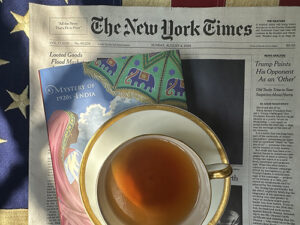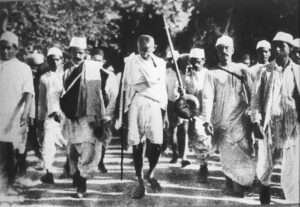This post originally appeared on Murder Is Everywhere.

(Ed. note: Perveen Mistry, a female lawyer living in 1920’s Bombay, has reached across time and reality to write a frank letter to 2024 voters. As the chronicler of Perveen’s legal mysteries, I’m impressed by her forthright investigations of political issues and modern technology. Let us enjoy her ramblings and perhaps find a few kernels of timeless wisdom.)
To My Dearest Readers Abroad:
I send very best greetings from Bombay, where we are deluged by the rainy season, and I spend much time trapped inside my family home in Dadar Parsi Colony. If the newsboy can get through the flooded streets, he delivers a paper that is the highlight of my day. So, imagine my surprise when, instead of handing me the August 4, 1924, Sunday edition of Times of India, he brought me a bundle of Sunday newspapers titled The New York Times dating from August 4, 2024, as well as the previous weekend in July!
What kind of magic brought these epistles from a remote land and time? At first, I worried that the experience meant that I am suffering insanity. I’ve come to think I’m part of a very complicated, literary dream that has allowed me hours of excitement. Because of the similarities between me and Miss Kamala Harris, clearly only I could be the architect of this fantasy. But there remains a possibility that these engaging tabloids are an authentic portent—and that is why I am writing an open letter to the dear citizens of the United States in future times.
Could it be true that an election for the presidency of your country is 92 days hence? If so, the papers are saying that female voters are anticipated to be very active. In my day, very few women are allowed to vote in elections—it happened just recently in Bombay that ladies owing property and suitable income can vote in elections. Thus, my mother has a voting right, because her name appears alongside my father’s on the household deed. That privilege is not mine yet, I am a supporter of universal suffrage regardless of gender and income; I’ve enclosed a picture of Indian suffragists in London in 1911, fighting to say this.

Being unable to vote is a great frustration for me; although I must say the candidates who have come up in the Bombay for the city legislative spots are rather dull. The powerful rulers—the viceroy in charge of governing British India, and the governor of my own Bombay Presidency—are hand-picked by Britain’s prime minister; it has nothing to do with their popularity in India. Within the last few years, though, Indians have the right to run for seats in the central legislative, the council of state, and provincial assemblies. And this is a good start.
I tell myself that I can support forward-thinking politics in Bombay by attending meetings to hear these candidates. Chiefly, I’ve made donations of my own hard-earned money and inheritance to the candidates who are brave enough to speak up for dominion status or any sort of freedom from colonial rule. Take note of a treasured photograph of the esteemed Mohandas Karamchand Gandhi in a peaceful procession with his supporters.

Even with my limited political experience, I beg to offer a few words to faraway citizen living in the strange new world your newspapers illustrated.
My first recommendation is to be cognizant of your own ability to cast a vote. If you voted without incident four years ago, things are likely fine; but many such voters receive a notice by mail, reminding them that they will receive a postal ballot by mail or should vote in person. If citizens have moved out of station, or only recently registered to vote, it’s prudent to check that your papers are in order to enable voting. College students who will be away from their native place in November especially need to ensure their ability to vote.
My second point is financial. It is quite common to receive solicitation for donation from various candidates and political parties. Yet we must keep an eye out for unscrupulous organizations that abuse presidential candidates’ names for their own purposes. (Ed note: I recently received a text promising to match any credit card donation to the Harris campaign by 400 percent. Highly dubious!)
Ahem—let’s return to business, shall we? My heartfelt plea is to give to others running for office: the many good people running to take places as senators and congressional representatives. These people aren’t so much in the news, and they receive scant funds in comparison to presidential candidates. Yet they are crucial, for how could a president suggest societal improvements be put into law without having a solid base of elected members of Congress to pass such laws? Please do the needful and support them!
Another of my pleas is to put pen to paper. A good letter can brighten a day and inspire a person to action. Why not send personal cards to people around the country urging them to vote in this election? There are postcard-writing parties throughout America—and I can attest that it’s a practical use of time to write letters from home during inclement weather.
Now, might I address larger types of gatherings? Here in India, large political assemblies in public are often prohibited by the government on the basis that they incite sedition. How fortunate you are to be able to dance and cheer in university stadiums for the sake of politics! I also learned that modern Americans may view films of such gatherings from their own houses, which sounds most amusing. Another curiosity I read about is something called a Zoom meeting for fundraising and political encouragement. Apparently, news spread from person to person, and audiences of thousands come together to witness the meeting whilst actually remaining in their various homes.
The Zoom business is incomprehensible, but I can discuss what it means to do political work outside the home. Motivated individuals may enroll to assist on the important day either as an elections judge or nonpartisan election observer. If people wish to campaign to the very end, they can drive to swing states to distribute materials and even help people who need transportation to polling places.
What choices you have! But this idea of “choice” is something that you will surely lose, should a small group of conservatives take control of your diverse and impressive nation. These men have publicly stated their desires to implement strict laws about childbearing and other personal behavior, and to dismantle education and censor libraries and the press. Believe it when I say your society will suffer under such laws—that’s how it is in my time.
Yours sincerely,
Perveen Mistry (Miss)
Partner, Mistry Law
Mistry House, 10 Bruce Street,
Fort, Bombay.

Delightfull! Brilliant and on target, Ms Massey!! And yes, all her points are well taken.
Thanks a lot for reading, Susan!
Yes…thank you so much. So many here need this kind of reminder.
I will be writing postcards this Tuesday evening. Thank you so much for reading.
I just finished the Mistress of Bhatia House from my library today (amazing!!) and happened across this post! Perveen would be ashamed of me because I’m supposed to be working 🙂 Thank you for this!!
Thank you for this.
As an alternative to (or in addition to ) postcards, sign up with Vote Forward to write letters. The people Vote Forward has names and addresses for a those who lean Democratic but don’t always vote. That’s probably the same idea as the lists for postcards. The letter begins with a statement “I vote because…” Sometimes, I finish the sentence with information that I vote because my grandmothers could not. My mother’s mother was a suffragist. I think Perveen would have approved of her.
My father’s mother didn’t vote even after 1920 when women could vote. She lived in Texas, and they had a poll tax. She told me they could not afford to pay poll tax for both of them – because they would cancel each other’s vote.
This was a thoughtful reminder of what our vote for a female president could mean. It was a relief after the endless solicitations received everyday.
Thanks!
I vote for pro-choice candidates.